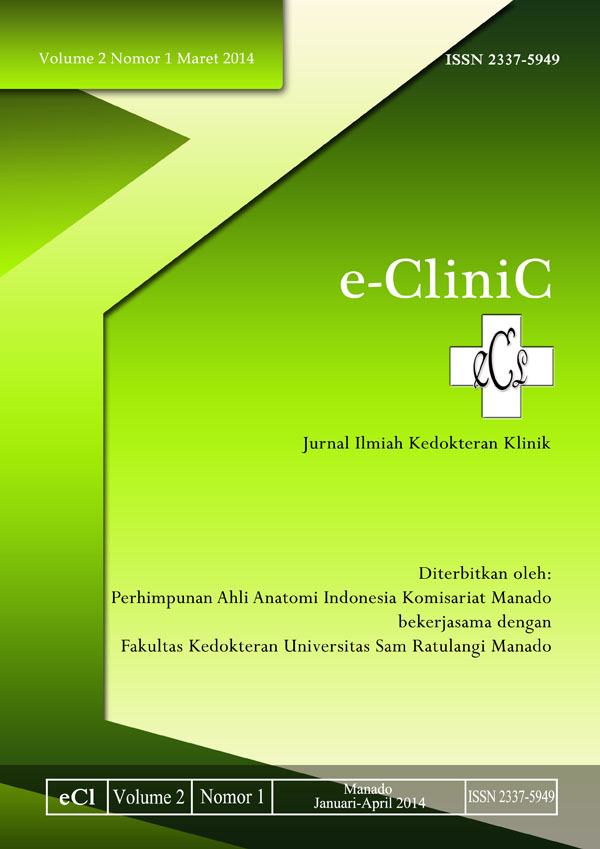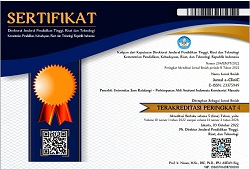GAMBARAN PENGETAHUAN DAN SIKAP IBU HAMIL TENTANG ASI EKSKLUSIF DI POLIKLINIK OBSTETRI BLU RSUP PROF. DR. R. D. KANDOU MANADO
DOI:
https://doi.org/10.35790/ecl.v2i1.3618Abstract
Abstrak: Air susu ibu (ASI) merupakan makanan terbaik bagi bayi karena mengandung zat gizi yang ideal untuk bayi, terutama pada umur 0 sampai 6 bulan. ASI Eksklusif adalah ASI yang diberikan kepada bayi sejak dilahirkan selama enam bulan, tanpa menambahkan dan/atau mengganti dengan makanan atau minuman lain. Hasil riset kesehatan dasar tahun 2010 bayi yang diberikan ASI eksklusif sampai 6 bulan hanya 15,3%. Provinsi Sulawesi Utara pada tahun 2010 cakupan ASI eksklusifnya hanya sebesar 22,61%, yang masih terpaut jauh dari target nasional yaitu 80%. Tujuan dari penelitian ini untuk mengetahui gambaran pengetahuan dan sikap ibu hamil di Poliklinik Obstetri BLU RSUP Prof. DR. R.D. Kandou Manado tentang pentingnya ASI eksklusif. Penelitian ini bersifat deskriptif dengan menggunakan pendekatan cross sectional. Sampel penelitian sebesar 50 sampel ibu hamil. Instrumen yang digunakan adalah kuesioner. Analisis data dilakukan secara univariat. Hasil penelitian menunjukkan ibu dengan pengetahuan baik tentang ASI eksklusif ada sebanyak 38%, pengetahuan tidak baik ada 62%. sikap baik tentang ASI eksklusif sebanyak 46% dan sikap yang tidak baik 54%. Terdapat kelompok karakteristik yang paling banyak berpengetahuan baik dan berpengetahuan tidak baik terdapat pada kelompok yang sama (>30tahun, SLTA, Tidak bekerja). Sedangkan kelompok karakteristik yang paling banyak memiliki sikap baik dan sikap tidak baik terdapat pada kelompok yang sama juga (>30tahun, SLTA, Tidak bekerja). Kesimpulan: didapatkan paling banyak yang berpengetahuan tidak baik, dan sikap tidak baik. Namun, tidak dapat dilihat adanya pengaruh yang signifikan antara karakteristik umur, pendidikan, dan pekerjaan terhadap pengetahuan dan sikap ibu hamil tentang ASI eksklusif pada penelitian ini oleh karena beberapa faktor.
Kata kunci: Pengetahuan, Sikap, ASI Eksklusi
Â
Â
Abstract: Breast milk is the best meal for babies because it contains ideal nutritions for babies, espesially for 0 to 6 months babies. Exclusive breast milk is the one the mothers give since they was born until 6 months old, without adding or replacing it with any other meals or drinks. The result of 2010 basic health study states that there were 15,3% babies given exclusive breast milk, while 22,61% of that number was in north celebes, which were far away from national target, 80%. The aim of this study is to describe the knowledge and attitude of pregnant women in obsgyn clinic in Kandou Hospital about how important exclusive breast milk is. This is a descriptive study using cross sectional approachment. This study has 50 samples of pregnant women, using quittionaire as instrument. Data analysis is done by univariet. Result shows 38% of pregnant women have good knowledge about exclusive breast milk and 62% have bad knowledge. Good attitude about exclusive breast milk reaches 46% while 54% has bad attitude. This study identified the group with good and bad knowledge were in the same group (<30 years old, senior high school, unemployee). At the same time, group with most number of good and bad attitude were also in the same group (<30 years old, senior high school, unemployee). Conclusion: This study results that bad knowledge and attitude have the highest percentage. However, it is unable to see the significant effect between age, education and occupation characteristic with the knowledge and attitude of pregnant women about exclusive breast milk in this study because of some factors.
Keyword: Knowledge, Attitude, Exclusive Breast Milk.
Downloads
How to Cite
Issue
Section
License
COPYRIGHT
Authors who publish with this journal agree to the following terms:
Authors hold their copyright and grant this journal the privilege of first publication, with the work simultaneously licensed under a Creative Commons Attribution License that permits others to impart the work with an acknowledgment of the work's origin and initial publication by this journal.
Authors can enter into separate or additional contractual arrangements for the non-exclusive distribution of the journal's published version of the work (for example, post it to an institutional repository or publish it in a book), with an acknowledgment of its underlying publication in this journal.
Authors are permitted and encouraged to post their work online (for example, in institutional repositories or on their website) as it can lead to productive exchanges, as well as earlier and greater citation of the published work (See The Effect of Open Access).







